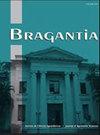Impacts of edible coatings enriched with laurel essential oil on the storage life of strawberry ‘Camarosa’ fruits
IF 1.5
4区 农林科学
Q2 AGRICULTURE, MULTIDISCIPLINARY
引用次数: 3
Abstract
: The current research was carried out to test the effects of edible coatings (EC) enriched with laurel essential oil (EC+LEO) on the storability of strawberry ‘Camarosa’ fruits. Freshly harvested strawberry fruits were randomly separated into three groups and each group was treated with a different treatment, including EC, EC+LEO and control. Fruits were stored at 4.0 ± 1.0 °C and a relative humidity of 90–95% for 15 days. Results suggested that both EC and EC+LEO have positive effects of the quality parameters of strawberry fruits and help to improve the storage duration of the fruits. After 15 days of storage, the average weight loss of the control fruits reached to 12.44%, but was kept at 9.06% and 7.13% at the EC and EC+LEO treated fruits, respectively. Both the EC and EC+LEO treatments were found to have positive impact on the prevention of disease severity and chemical spoilage and lowering respiration rate of the fruits. The loss in the fruit firmness, soluble solids concentration, ascorbic acid content and titratable acidity of the fruits were also found to delay in the coated fruits. The EC+LEO treatment was found to have better performance than the EC treatment. Overall results recommended that the edible coatings enriched with laurel essential oil improve the storability of strawberry fruits and have possibility to be used in postharvest industry.月桂精油可食性涂层对Camarosa草莓果实贮藏寿命的影响
摘要:本研究旨在测试富含月桂精油的食用涂层(EC+LEO)对Camarosa草莓果实可贮藏性的影响。将新鲜收获的草莓果实随机分为三组,每组分别进行EC、EC+LEO和对照处理。果实在4.0±1.0℃、相对湿度90-95%条件下保存15天。结果表明,EC和EC+LEO对草莓果实品质参数均有积极影响,有助于提高果实的贮藏期。贮藏15 d后,对照果实的平均失重率为12.44%,EC和EC+LEO处理果实的平均失重率分别为9.06%和7.13%。结果表明,EC和EC+LEO处理对预防病害严重程度和化学变质、降低果实呼吸速率均有积极影响。果实硬度、可溶性固形物浓度、抗坏血酸含量和可滴定酸度的下降也导致覆膜果实的延迟。EC+LEO治疗效果优于EC治疗。综上所述,添加月桂精油的可食性涂料提高了草莓果实的贮藏性,具有采后工业应用的可能性。
本文章由计算机程序翻译,如有差异,请以英文原文为准。
求助全文
约1分钟内获得全文
求助全文
来源期刊

Bragantia
AGRICULTURE, MULTIDISCIPLINARY-
CiteScore
2.40
自引率
8.30%
发文量
33
审稿时长
4 weeks
期刊介绍:
Bragantia é uma revista de ciências agronômicas editada pelo Instituto Agronômico da Agência Paulista de Tecnologia dos Agronegócios, da Secretaria de Agricultura e Abastecimento do Estado de São Paulo, com o objetivo de publicar trabalhos científicos originais que contribuam para o desenvolvimento das ciências agronômicas.
A revista é publicada desde 1941, tornando-se semestral em 1984, quadrimestral em 2001 e trimestral em 2005.
É filiada à Associação Brasileira de Editores Científicos (ABEC).
 求助内容:
求助内容: 应助结果提醒方式:
应助结果提醒方式:


